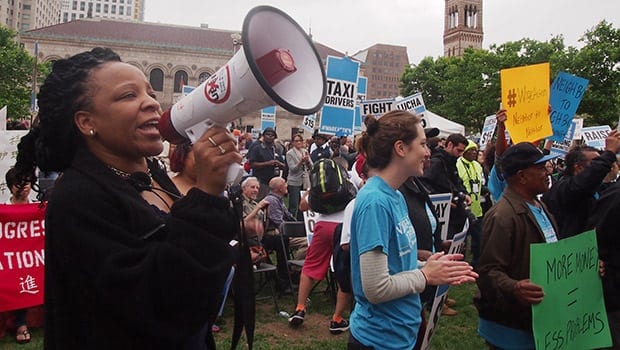Labor coalition pushing for higher wages as Senate approves $11/hour minimum wage

While Massachusetts state senators were busy passing legislation that would raise the state’s minimum wage to $11 an hour, labor activists and community groups in Boston hit the streets, protesting wage inequality and pushing for a $15 an hour minimum wage.
Several hundred marchers rallied in Copley Square before marching through Back Bay, stopping at two restaurants and a home care agency to highlight the low wages workers in a variety of sectors are facing in Boston.
“I want to earn a living wage in my chosen profession,” said adjunct professor Maureen Sullivan. “I’m among the lowest paid workers in the Commonwealth and in the nation.”
The Boston demonstration corresponded with demonstrations in Worcester and Springfield and followed demonstrations at national shareholders’ meetings for McDonald’s and Walmart.
The Senate vote on the $11 Massachusetts minimum wage came after state labor groups collected more than 350,000 signatures for ballot measures that would secure a minimum wage of $10.50 an hour indexed to inflation and mandate earned sick time for all workers. The grassroots signature-gathering campaign was the largest volunteer effort of its kind in the state’s history, according to Harris Gruman, executive director of the Service Employees International Union Massachusetts State Council.
Gruman says a third of the signatures were collected by union volunteers, a third by faith-based groups and a third by community-based organizations.
“When we [organize] folks through their work, through their unions, where they worship and where they live, through their community groups, we really involve them deeply in the movement for social change. It’s great to have all three legs of that coalition strong and equal in the fight for the minimum wage and earned sick time.”
The current minimum wage in Massachusetts is $8 an hour, higher than the federal minimum wage of $7.25 but lower than the so-called living wage in the state, which The Living Wage Project estimates to be $12.65 for a single adult. The group’s calculation takes into account how much individuals and families would need to pay rent, medical care, transportation and other expenses living in different cities.
Union officials have not yet decided whether they will go forward with the ballot measure for the minimum wage or withdraw the measure in favor of the Senate bill, Gruman said. The ballot measure on earned sick time will go forward, he added.
In Boston, last Thursday’s action marked the kickoff for the Fight for $15, a push to increase wages for low-paid workers in the city. During the rally, fast food workers, a cab driver, a janitor, a home care worker and Sullivan, the adjunct professor, were among those who spoke about their struggles making ends meet in Boston.
“We as a nation and as a global society cannot continue treating the people who are educating the next generation as pariahs,” Sullivan said.
Cab driver Pierre Duchemin spoke about the challenges of working for a cab company in Boston.
“The taxi industry is the equivalent of modern-day sharecropping,” he said. “It seems everybody but me is making money off of my work.”
The message of the rally was aimed both at the media, which gave it scant coverage, as well as the workers themselves. Darlene Lombos, executive director at Community Labor United, a group that coordinates collaborations between community groups and labor, said the march helped build solidarity between different classes of workers.
“We have to stand together if we’re going to win anything,” she said. “None of the groups here can do it alone. None of them.”
The march ended at Legal Sea Foods, the owner of which, Roger Berkowitz, is reportedly among a group who lobbied state legislators against raising the minimum wage for tipped workers. In a letter to Berkowitz, coalition members called on him to reverse his stance.
“It is your continued efforts to stall change that has brought hundreds of workers and allies to the doorstep of Legal Sea Foods today,” the letter reads. “We call on you to end your opposition to fair pay for tipped wage workers.”







